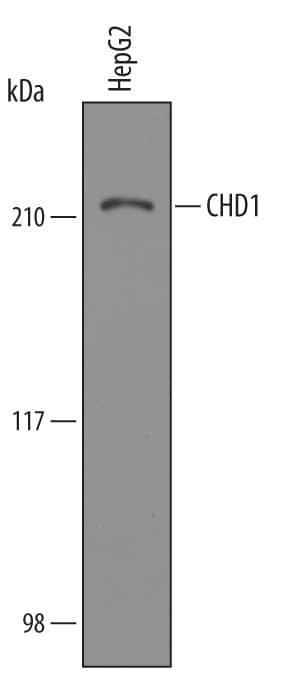Human/Mouse CHD1 Antibody
R&D Systems, part of Bio-Techne | Catalog # AF6195

Key Product Details
Validated by
Species Reactivity
Applications
Label
Antibody Source
Product Specifications
Immunogen
Lys1531-Thr1710
Accession # O14646
Specificity
Clonality
Host
Isotype
Scientific Data Images for Human/Mouse CHD1 Antibody
Detection of Human CHD1 by Western Blot.
Western blot shows lysates of HepG2 human hepatocellular carcinoma cell line. PVDF Membrane was probed with 1 µg/mL of Sheep Anti-Human/Mouse CHD1 Antigen Affinity-purified Polyclonal Antibody (Catalog # AF6195) followed by HRP-conjugated Anti-Sheep IgG Secondary Antibody (Catalog # HAF016). A specific band was detected for CHD1 at approximately 210 kDa (as indicated). This experiment was conducted under reducing conditions and using Immunoblot Buffer Group 8.Western Blot Shows Human CHD1 Specificity by Using Knockout Cell Line.
Western blot shows lysates of HEK293T human embryonic kidney parental cell line and CHD1 knockout HEK293T cell line (KO). PVDF membrane was probed with 1 µg/mL of Sheep Anti-Human/Mouse CHD1 Antigen Affinity-purified Polyclonal Antibody (Catalog # AF6195) followed by HRP-conjugated Anti-Sheep IgG Secondary Antibody (Catalog # HAF016). A specific band was detected for CHD1 at approximately 210 kDa (as indicated) in the parental HEK293T cell line, but is not detectable in knockout HEK293T cell line. GAPDH (Catalog # AF5718) is shown as a loading control. This experiment was conducted under reducing conditions and using Immunoblot Buffer Group 1.Applications for Human/Mouse CHD1 Antibody
Knockout Validated
Western Blot
Sample: HepG2 human hepatocellular carcinoma cell line
Formulation, Preparation, and Storage
Purification
Reconstitution
Formulation
Shipping
Stability & Storage
- 12 months from date of receipt, -20 to -70 °C as supplied.
- 1 month, 2 to 8 °C under sterile conditions after reconstitution.
- 6 months, -20 to -70 °C under sterile conditions after reconstitution.
Background: CHD1
CHD1 (Chromohelicase/ATPase DNA‑binding protein 1) is a 200‑220 kDa member of the SNF2/RAD54 helicase family of proteins. It is an ATP‑dependent chromatin remodeling factor that helps maintain chromatin in a transcriptionally active state. In embryonic stem cells, CHD1 associates with the promoters of active genes, a condition that is associated with open chromatin and pluripotency. Human CHD1 is 1710 amino acids (aa) in length. It contains two Ser‑rich regions (aa 1‑70 and 117‑137), two Chromo (chromatin‑organizer‑modifer) domains (aa 272‑364 and 389‑452), a SNF2 family N‑terminal domain (aa 484‑763) and a C‑terminal helicase domain (aa 792‑943). There are at least 30 Ser/Thr phosphorylation sites. Over aa 1531‑1710, human CHD1 shares 92% aa identity with mouse CHD1.
Long Name
Alternate Names
Gene Symbol
UniProt
Additional CHD1 Products
Product Documents for Human/Mouse CHD1 Antibody
Product Specific Notices for Human/Mouse CHD1 Antibody
For research use only

